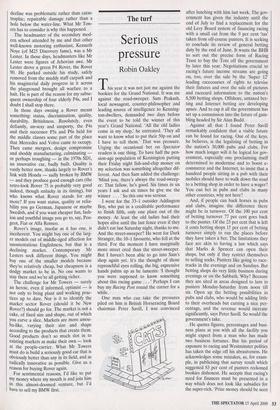Motoring
Problem product
Alan Judd
Motoring correspondents commonly slosh out advice like dirty water at the bot- tom of the bucket after they've washed their Bugattis, but it's still surprising when it's lapped up promptly: BMW's divorce from Rover was, of course, predicted and urged by this column in the Spectator Christmas issue, though the manner of it was not predicted. The only solace in the sorry affair is its confirmation that motor- industry moguls rarely move without con- sulting the Spectator; the only puzzle, that it should have surprised anyone taking the slightest interest in the matter, particularly the responsible minister, Stephen Byers, who is paid by the taxpayer to do precisely that.
At the time of writing John Towers, for- mer Rover chief executive, is putting together an alternative bid for Longbridge. We should wish him well. His real problem, if he succeeds, is not simply to avoid the alleged strategic ineptitude of BMW's stewardship — though it would be interest- ing to see a breakdown of all those losses and maybe if they'd stuck with the new Rover project, the R30 (challenger to the VW Golf), Rover's decline would have bot- tomed out. Nor is it the much-touted strong pound — weak euro, to be honest, since the pound remains roughly stable against the dollar and the yen — although one report argued that, since 60 per cent of Rovers were exported and 80 per cent of their parts sourced in the UK, BMW's cur- rency-driven losses last year amounted to f200 million. Currency differentials may contribute to your problems but they don't make a decisive difference if your product is high in status and demand; witness the success of Mercedes and BMW, built up during decades of strong D-marks. If peo- ple think they're buying quality, they pay.
The problem with Rover is the product. The figures — 333,000 sold in 1988, 143,000 just over a decade later — indicate the collapse of its home market. British buyers were not walking into Rover show- rooms often enough. Although it wouldn't compensate for declining exports, a strong home market would mean that such a decline was problematic rather than catas- trophic; repairable damage rather than a hole below the water-line. What Mr Tow- ers has to consider is why this happened.
The headmaster of the secondary mod- ern school attended by me and that other well-known motoring enthusiast, Kenneth Noye (of M25 Discovery fame), was a Mr Lester. In those days, headmasters like Mr Lester were figures of Jehovian awe. Mr Lester drove a green P4 Rover, the Rover 90. He parked outside his study, safely removed from the muddy staff carpark and his magisterial daily progress in it across the playground brought all warfare to a halt. He is part of the reason for my subse- quent ownership of four elderly P4s, and I doubt I shall stop there.
In those days owning a Rover meant something: status, discrimination, quality, durability, Britishness. Resolutely, even defiantly, un-sexy and unsporty, the P4s and their successor P5s and P6s held for the middle classes some part of the place that Mercedes and Volvo came to occupy. Then came mergers, design compromise and shoddy manufacturing, culminating — or perhaps troughing — in the 1970s SD1, an innovative car, badly built. Quality is vastly better now, thanks largely to Rover's link with Honda — sadly broken by BMW — and they produce good enough cars (the retro-look Rover 75 is probably very good indeed, though unlucky in its timing), but who knows what Rover stands for any more? If you want status, quality or relia- bility you go German, Japanese or maybe Swedish, and if you want cheaper fun, fash- ion and youthful image you go to, say, Peu- geot, Fiat or Alfa Romeo.
Rover's image, insofar as it has one, is incoherent. You might buy one of the larg- er models out of middle-aged affection for unostentatious Englishness, but that is a declining market. Contemporary Mr Lesters seek different things. You might buy one of the smaller models because they're relatively cheap, but cheapness is a dodgy market to be in. No one wants to stay there and we're all getting richer.
The challenge for Mr Towers — surely an heroic, even if informed, optimist — is not only to bring plant and working prac- tices up to date. Nor is it to identify the market sector Rover (should it be New Rover?) should go for. The market is not a cake, of fixed size and shape, out of which you carve a slice. Markets are more amoe- ba-like, varying their size and shape according to the products that create them. Good products don't so much slot in to existing markets as make their own — look at the people-carrier. What Mr Towers must do is build a seriously good car that is Obviously better than any in its field, and as radically innovative as possible. Give us a reason for buying Rover again. For sentimental reasons, I'd like to put ?Tv money where my mouth is and join him in this almost-doomed venture, but I'd have to sell my BMW first.



































































 Previous page
Previous page